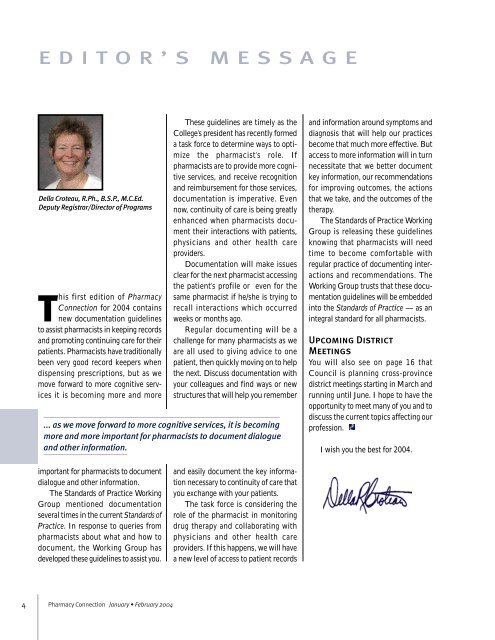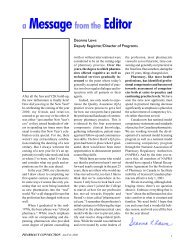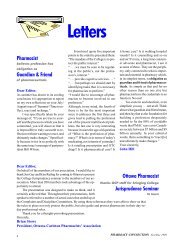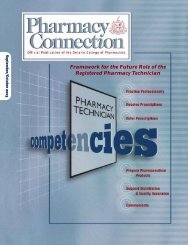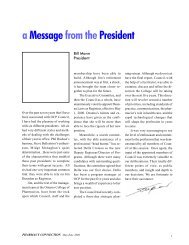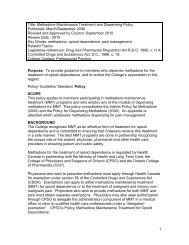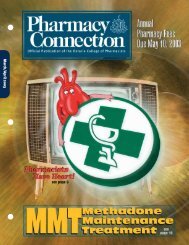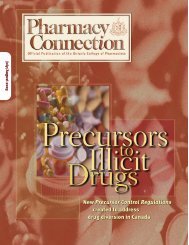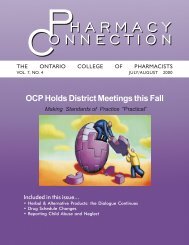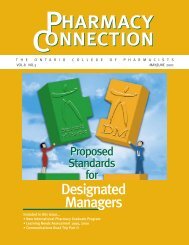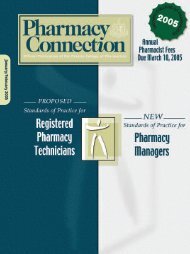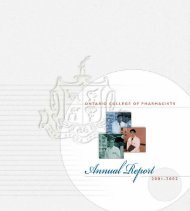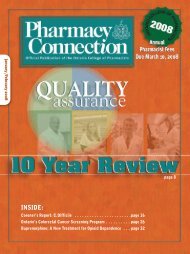January/February 2004 - Ontario College of Pharmacists
January/February 2004 - Ontario College of Pharmacists
January/February 2004 - Ontario College of Pharmacists
You also want an ePaper? Increase the reach of your titles
YUMPU automatically turns print PDFs into web optimized ePapers that Google loves.
EDITOR’S<br />
MESSAGE<br />
Della Croteau, R.Ph., B.S.P., M.C.Ed.<br />
Deputy Registrar/Director <strong>of</strong> Programs<br />
This first edition <strong>of</strong> Pharmacy<br />
Connection for <strong>2004</strong> contains<br />
new documentation guidelines<br />
to assist pharmacists in keeping records<br />
and promoting continuing care for their<br />
patients. <strong>Pharmacists</strong> have traditionally<br />
been very good record keepers when<br />
dispensing prescriptions, but as we<br />
move forward to more cognitive services<br />
it is becoming more and more<br />
These guidelines are timely as the<br />
<strong>College</strong>’s president has recently formed<br />
a task force to determine ways to optimize<br />
the pharmacist’s role. If<br />
pharmacists are to provide more cognitive<br />
services, and receive recognition<br />
and reimbursement for those services,<br />
documentation is imperative. Even<br />
now, continuity <strong>of</strong> care is being greatly<br />
enhanced when pharmacists document<br />
their interactions with patients,<br />
physicians and other health care<br />
providers.<br />
Documentation will make issues<br />
clear for the next pharmacist accessing<br />
the patient’s pr<strong>of</strong>ile or even for the<br />
same pharmacist if he/she is trying to<br />
recall interactions which occurred<br />
weeks or months ago.<br />
Regular documenting will be a<br />
challenge for many pharmacists as we<br />
are all used to giving advice to one<br />
patient, then quickly moving on to help<br />
the next. Discuss documentation with<br />
your colleagues and find ways or new<br />
structures that will help you remember<br />
... as we move forward to more cognitive services, it is becoming<br />
more and more important for pharmacists to document dialogue<br />
and other information.<br />
and information around symptoms and<br />
diagnosis that will help our practices<br />
become that much more effective. But<br />
access to more information will in turn<br />
necessitate that we better document<br />
key information, our recommendations<br />
for improving outcomes, the actions<br />
that we take, and the outcomes <strong>of</strong> the<br />
therapy.<br />
The Standards <strong>of</strong> Practice Working<br />
Group is releasing these guidelines<br />
knowing that pharmacists will need<br />
time to become comfortable with<br />
regular practice <strong>of</strong> documenting interactions<br />
and recommendations. The<br />
Working Group trusts that these documentation<br />
guidelines will be embedded<br />
into the Standards <strong>of</strong> Practice — as an<br />
integral standard for all pharmacists.<br />
Upcoming District<br />
Meetings<br />
You will also see on page 16 that<br />
Council is planning cross-province<br />
district meetings starting in March and<br />
running until June. I hope to have the<br />
opportunity to meet many <strong>of</strong> you and to<br />
discuss the current topics affecting our<br />
pr<strong>of</strong>ession.<br />
I wish you the best for <strong>2004</strong>.<br />
important for pharmacists to document<br />
dialogue and other information.<br />
The Standards <strong>of</strong> Practice Working<br />
Group mentioned documentation<br />
several times in the current Standards <strong>of</strong><br />
Practice. In response to queries from<br />
pharmacists about what and how to<br />
document, the Working Group has<br />
developed these guidelines to assist you.<br />
and easily document the key information<br />
necessary to continuity <strong>of</strong> care that<br />
you exchange with your patients.<br />
The task force is considering the<br />
role <strong>of</strong> the pharmacist in monitoring<br />
drug therapy and collaborating with<br />
physicians and other health care<br />
providers. If this happens, we will have<br />
a new level <strong>of</strong> access to patient records<br />
4<br />
Pharmacy Connection <strong>January</strong> • <strong>February</strong> <strong>2004</strong>


